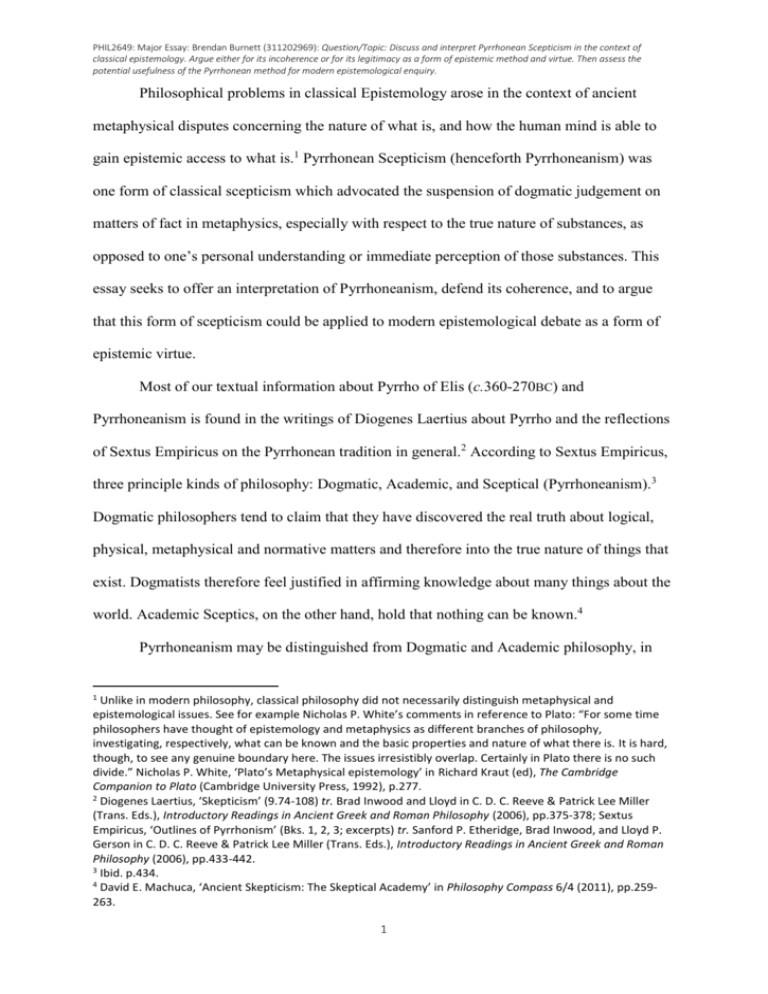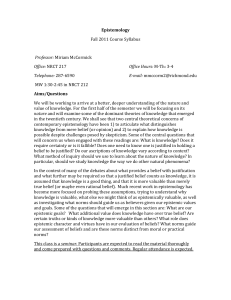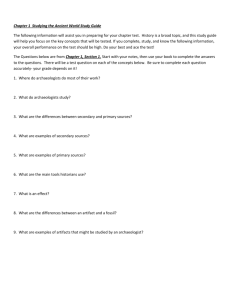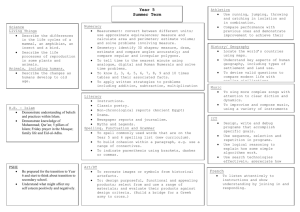PHIL2649 Maj. Ess.
advertisement

PHIL2649: Major Essay: Brendan Burnett (311202969): Question/Topic: Discuss and interpret Pyrrhonean Scepticism in the context of classical epistemology. Argue either for its incoherence or for its legitimacy as a form of epistemic method and virtue. Then assess the potential usefulness of the Pyrrhonean method for modern epistemological enquiry. Philosophical problems in classical Epistemology arose in the context of ancient metaphysical disputes concerning the nature of what is, and how the human mind is able to gain epistemic access to what is.1 Pyrrhonean Scepticism (henceforth Pyrrhoneanism) was one form of classical scepticism which advocated the suspension of dogmatic judgement on matters of fact in metaphysics, especially with respect to the true nature of substances, as opposed to one’s personal understanding or immediate perception of those substances. This essay seeks to offer an interpretation of Pyrrhoneanism, defend its coherence, and to argue that this form of scepticism could be applied to modern epistemological debate as a form of epistemic virtue. Most of our textual information about Pyrrho of Elis (c.360-270BC) and Pyrrhoneanism is found in the writings of Diogenes Laertius about Pyrrho and the reflections of Sextus Empiricus on the Pyrrhonean tradition in general.2 According to Sextus Empiricus, three principle kinds of philosophy: Dogmatic, Academic, and Sceptical (Pyrrhoneanism).3 Dogmatic philosophers tend to claim that they have discovered the real truth about logical, physical, metaphysical and normative matters and therefore into the true nature of things that exist. Dogmatists therefore feel justified in affirming knowledge about many things about the world. Academic Sceptics, on the other hand, hold that nothing can be known.4 Pyrrhoneanism may be distinguished from Dogmatic and Academic philosophy, in 1 Unlike in modern philosophy, classical philosophy did not necessarily distinguish metaphysical and epistemological issues. See for example Nicholas P. White’s comments in reference to Plato: “For some time philosophers have thought of epistemology and metaphysics as different branches of philosophy, investigating, respectively, what can be known and the basic properties and nature of what there is. It is hard, though, to see any genuine boundary here. The issues irresistibly overlap. Certainly in Plato there is no such divide.” Nicholas P. White, ‘Plato’s Metaphysical epistemology’ in Richard Kraut (ed), The Cambridge Companion to Plato (Cambridge University Press, 1992), p.277. 2 Diogenes Laertius, ‘Skepticism’ (9.74-108) tr. Brad Inwood and Lloyd in C. D. C. Reeve & Patrick Lee Miller (Trans. Eds.), Introductory Readings in Ancient Greek and Roman Philosophy (2006), pp.375-378; Sextus Empiricus, ‘Outlines of Pyrrhonism’ (Bks. 1, 2, 3; excerpts) tr. Sanford P. Etheridge, Brad Inwood, and Lloyd P. Gerson in C. D. C. Reeve & Patrick Lee Miller (Trans. Eds.), Introductory Readings in Ancient Greek and Roman Philosophy (2006), pp.433-442. 3 Ibid. p.434. 4 David E. Machuca, ‘Ancient Skepticism: The Skeptical Academy’ in Philosophy Compass 6/4 (2011), pp.259263. 1 PHIL2649: Major Essay: Brendan Burnett (311202969): Question/Topic: Discuss and interpret Pyrrhonean Scepticism in the context of classical epistemology. Argue either for its incoherence or for its legitimacy as a form of epistemic method and virtue. Then assess the potential usefulness of the Pyrrhonean method for modern epistemological enquiry. that it purports to make no claims about the true nature of our world without denying the possibility. Pyrrhoneanism is characterised by skepsis (inquiry) on part of the skeptikos (inquirer).5 In general, the Pyrrhonean tradition cast doubts on our cognitive ability to grasp the nature of the world as it really is, as opposed to my mere perception of the world. There are important similarities between Academic philosophy and Pyrrhoneanism.6 Pyrrhoneanism, Richard Bett tentatively suggests, may have shared influences from several philosophical predecessors.7 These include: the Indeterminacy Thesis,8 Aristotle’s Law of Noncontradiction,9 the self-critical Instability Thesis of Plato’s Theaetetus,10 the Eleatic doctrine of the deception of appearances,11 Xenophanes’ assent to mere belief (dokos) as opposed to rationally justifiable belief about the external world according to the relativity of individual sense-perception,12 Protagoras’ scepticism about theology because of the disagreement of the polytheistic faiths,13 Democritus’ atomic theory of perceptual ambiguity and doctrine of the end-goal of philosophy as possessing a ‘good spirit’ (euthumia) or ‘wellbeing’ (euestō),14 the Cynics’ doctrines about perceptual experience as possible illusion reaming and general attitude of tentativeness towards theoretical enquiry in general,15 the Megrarian opposition to predication,16 and more interestingly the far-eastern Buddhist doctrines of impermanence the insubstantiality of ordinary objects.17 Bett seems tentative about positing each of these in the development of Pyrrhoneanism directly, bbut aintains it is nevertheless possible that they had some relevance to the Pyrrhonean movement. For in 5 David E. Machuca, ‘Ancient Skepticism: Pyrrhonism’ in Philosophy Compass 6/4 (2011), p.251. David E. Machuca, ‘Ancient Skepticism: Overview’ in Philosophy Compass 6/4 (2011), pp.234-245. 7 Richard Bett, Pyrrho, his Antecedents, and his Legacy (2000), Ch. 3: “Looking Backwards” pp.112-188. 8 Ibid. pp.114-123. 9 Ibid. pp.123-131. 10 Ibid. pp.132-140. 11 Ibid. pp.140-143. 12 Ibid. pp.143-149. 13 Ibid. pp.149-152. 14 Ibid. pp.152-160. 15 Ibid. pp.160-165. 16 Ibid. pp.165-169. 17 Ibid. pp.169-178. 6 2 PHIL2649: Major Essay: Brendan Burnett (311202969): Question/Topic: Discuss and interpret Pyrrhonean Scepticism in the context of classical epistemology. Argue either for its incoherence or for its legitimacy as a form of epistemic method and virtue. Then assess the potential usefulness of the Pyrrhonean method for modern epistemological enquiry. common to each these beliefs is the garnering of doubt concerning the legitimacy and accuracy of our perceptual and conceptual powers about the real world past mere belief. And that is Pyrrhoneanism. The limitations and ambiguities of sense perception and consequent conceptual formulations led Pyrrhoneanism to postulate that philosophers ought to suspend judgement or belief (epochē) about all and every ambiguous or debatable subject of interest as the telos or goal of philosophical enquiry.18 For the Pyrrhonean both Dogmatist and Academic are being too bold in their assertions about the true nature of things. This suspension of judgement or belief, says the Pyrrhonean, will lead to mental tranquillity (ataraxia), and this tranquillity or mental calm should lead to an ‘ordinary life’ (bios) that is ‘without opinions’ (adoxastos).19 Alan Bailey asks us to consider this claim: ‘There is an even number of grains of sand in the Libyan Desert.’ When one encounters this claim, suspension of belief arises naturally. Even though one knows that there is a potential answer one could give, it is just be extraordinarily difficult and impractical to determine the outcome. Therefore the proposition is neither believed nor disbelieved; judgement concerning is merely withheld. The goal of Pyrrhoneanism is ‘suspension of judgement, upon which freedom from anxiety follows like a shadow.’20 In order to show some more precise conditions for suspension of judgement, the primary sources indicate that Pyrrhoneans employed certain ‘modes’ or arguments indicating ambiguity that implies that judgement about the true nature of things needs to be suspended by the enquirer. Fifteen different modes are discussed by Diogenes Laertius in his writing 18 David E. Machuca, ‘Ancient Skepticism: Pyrrhonism’ in Philosophy Compass 6/4 (2011), pp. 247, 248, 252; Cf. Alan Bailey, Sextus Empiricus and Pyrrhonian Scepticism (2002), p.119. This theme arises in various philosophers. Cf. Sextus Empiricus, ‘Outlines of Pyrrhonism’ (Bks. 1, 2, 3; excerpts) tr. Sanford P. Etheridge, Brad Inwood, and Lloyd P. Gerson in C. D. C. Reeve & Patrick Lee Miller (Trans. Eds.), Introductory Readings in Ancient Greek and Roman Philosophy (2006), p.437. 19 Alan Bailey, Sextus Empiricus and Pyrrhonian Scepticism(2002), p.122. 20 Diogenes Laertius, ‘Skepticism’ (9.74-108) tr. Brad Inwood and Lloyd in C. D. C. Reeve & Patrick Lee Miller (Trans. Eds.), Introductory Readings in Ancient Greek and Roman Philosophy (2006), p.378. 3 PHIL2649: Major Essay: Brendan Burnett (311202969): Question/Topic: Discuss and interpret Pyrrhonean Scepticism in the context of classical epistemology. Argue either for its incoherence or for its legitimacy as a form of epistemic method and virtue. Then assess the potential usefulness of the Pyrrhonean method for modern epistemological enquiry. about Pyrrho—fifteen different basic arguments or observations in favour of Pyrrhoneanism by way of which Laertius calls “the Pyrrhonean strategy”.21 Firstly, Pyrrhonean Sceptics noted that there is ambiguity between different species of animal about pain-reception, and therefore about the objectivity of the reception of pain due to common causes; secondly, the idiosyncratic nature of man and each man’s individual tastes and affections spreads doubt on human qualities of taste and perception; thirdly, differences in sensory experience such as in taste distinctions (the same apple may be sweet to one and bitter to another); fourthly, the fluctuation of human dispositions of love/hate, sadness/joy, etc., should suspend one’s judgement about the nature and cogency of human personalities; fifth, the diversity of human cultures, moral beliefs and religious practices spreads doubt on the true nature of theological matters and ethical concerns; sixth, the emergence of properties that only seem to emerge and change in relation to other properties (e.g. skin complexion in the sunlight); seventh, perceptual ambiguity according to distance (e.g. a large building seems small far away); eighth, quantities and qualities can seem contradictory (e.g the wine that fortifies oneself in small amounts but in large quantities intoxicates and makes weak); ninth, the occurrence of odd happenings or phenomena in the world (e.g. miracles, natural disasters) casts doubt on the uniformity of nature; and tenth, there are comparisons and relations, i.e., something 100kg of weight is heavy, but it is light compared to a 10,000kg thing. Then, the ‘Agrippa School’ of Pyrrhoneanism also added five more general arguments which should cause one to suspend judgement in ordinary philosophical conversation.22 Firstly, the argument from disagreement shows that many brilliant minds have disagreed about many matters and this ought to deter one from making a judgement concerning them; secondly, the argument from infinite regress, whereby when one 21 Diogenes Laertius, ‘Skepticism’ (9.74-108) tr. Brad Inwood and Lloyd in C. D. C. Reeve & Patrick Lee Miller (Trans. Eds.), Introductory Readings in Ancient Greek and Roman Philosophy (2006), pp.375-378. 22 Ibid. pp.377-378. 4 PHIL2649: Major Essay: Brendan Burnett (311202969): Question/Topic: Discuss and interpret Pyrrhonean Scepticism in the context of classical epistemology. Argue either for its incoherence or for its legitimacy as a form of epistemic method and virtue. Then assess the potential usefulness of the Pyrrhonean method for modern epistemological enquiry. thing must always be based on some other thing, shows that we cannot really ground anything, since explanation would continue ad infinitum and nothing would be explained; thirdly, the argument from relativity suggests that things are never understood in relation to themselves but only in reference to other things, the problem of which is a variation on the infinite regress argument; fourthly, the argument from hypothesis posits that for ever hypothesis there may exist an equally plausible antithesis; and fifthly, the argument from insularity or circular argumentation shows that whenever in a case where some proposition P is based on Q, but where Q needs P, both P and Q are unjustified, and we must suspend judgement about them both. For each mode of argument leading to the suspension of judgement about whatever particular philosophical puzzle, it is easy to see from Laertius’ characterisation of the modes how modern scientific tools might help with solving them easily. Others are not so easy to solve on raw empirical data, however.23 For the purposes of this essay it is sufficient to note that the Pyrrhonean took there to be the relevant phenomena in question, but suspended his judgement about the true nature of the phenomena in question due to the confusion and ambiguity that arises for him.24 One primary challenge to Pyrrhoneanism is the claim that it is a self-defeating and incoherent view. If one is supposed to suspend judgement about all things, should not one then suspend judgement about suspending judgement? But this kind of argument is just a mistake. Whereas the Pyrrhonean Sceptic suspends judgement about the essential nature of ideas such as ethics or substances such as gods, that does not mean they cannot act on what appears immediately evident to their senses and inclinations personally. The Pyrrhonean does not assent to nothing at all, but he only suspends judgement about non-evident things. Phyrroneanism is a way of responding to controversial and ambiguous propositional claims 23 In any case, that would be unfair to ancient Pyrrhoneanism since ancient Greeks obviously did not have the tools we have today to investigate the natural world. 24 David E. Machuca, ‘Ancient Skepticism: The Skeptical Academy’ in Philosophy Compass 6/4 (2011), pp.259263. 5 PHIL2649: Major Essay: Brendan Burnett (311202969): Question/Topic: Discuss and interpret Pyrrhonean Scepticism in the context of classical epistemology. Argue either for its incoherence or for its legitimacy as a form of epistemic method and virtue. Then assess the potential usefulness of the Pyrrhonean method for modern epistemological enquiry. about the nature of substances.25 Machuca’s recent research on ancient Scepticism notes how ancient issues remain relevant for contemporary epistemologists.26 So far as Pyrrhoneanism goes, it seems we could cast it as a form of intellectual humility in epistemic enquiry—something often agreed upon as being a virtue by contemporary epistemologists, whereby one’s epistemic claims are situated in the consciousness of one’s own fallibility and limited evidence. Pyrrhoneans were tentative about postulating anything about the true nature of objects and therefore they suspend judgement concerning the true nature of substances in the world. Contemporary epistemologists Robert C. Roberts and W. Jay Wood note that caution in judgement is a virtue in the life of the mind. Caution is ‘a disposition of proper fear […] a disposition to fear what is worthy to be feared, to fear it enough (but not too much) and in the right way, and then to be able to avoid what is feared’, namely, error or unjustified statements. They continue, ‘Intellectual caution is wise fearing in cognitive matters. Wise cognitive fears are based on the love of knowledge, and the love of knowledge is based on a concern for the epistemic goods that situate them among the other goods of human life—a concern for information, understanding, and acquaintance that is significant, relevant, and worthy in the context of a human life.’27 The Pyrrhonean’s tentative attitude towards making claims about the true nature of substances plausibly exhibits this kind of epistemic caution, which is birthed from a form of intellectual humility on part of the intellectual philosopher. [EXPAND.] Pyrrhoneanism appears to be coherent doctrine of scepticism which models just the 25 Gail Fine, ‘Concepts and inquiry: Sextus and the Epicureans’ in Benjamin Morison and Katerina Ierodiakonou. Episteme, etc. (2011), p.90; Alan Bailey, Sextus Empiricus and Pyrrhonian Scepticism(2002), p.146; Julia Annas, ‘Ancient skepticism and ancient religion’ in Benjamin Morison and Katerina Ierodiakonou (Eds.) Episteme, etc. (2011), p.75. 26 27 Robert C. Roberts and W. Jay Wood, Intellectual Virtues: An Essay in Regulative Epistemology (2007) pp.234235. 6 PHIL2649: Major Essay: Brendan Burnett (311202969): Question/Topic: Discuss and interpret Pyrrhonean Scepticism in the context of classical epistemology. Argue either for its incoherence or for its legitimacy as a form of epistemic method and virtue. Then assess the potential usefulness of the Pyrrhonean method for modern epistemological enquiry. kind of epistemic humility required in critical investigations into metaphysics today. It was supported by argument and reason in the network of discussions about metaphysics and knowledge in the classical Greek world, and it provides an interesting example of classical Greek argumentative style in general. A softer form of the Pyrrhonean method is probably a good one for philosophers of knowledge to look into. [EXPAND.] BIBLIOGRAPHY ANNAS, Julia. ‘Ancient scepticism and ancient religion’ in Benjamin Morison and Katerina Ierodiakonou. Episteme, etc.: Essays in Honour of Jonathan Barnes (Oxford University Press, 2011), pp.74-89. BAILEY, Alan. Sextus Empiricus and Pyrrhonean Scepticism (Clarendon Press, 2002). BETT, Richard. Pyrrho, his Antecedents and his Legacy (Oxford University Press, 2000). FINE, Gail. ‘Concepts and inquiry: Sextus and the Epicureans’ in Benjamin Morison and Katerina Ierodiakonou. Episteme, etc.: Essays in Honour of Jonathan Barnes (Oxford University Press, 2011), pp.90-114. FLORIDI, Luciano. Sextus Empiricus: The Transmission and Recovery of Pyrrhonism (Oxford University Press, 2002). KRAUT, Richard. (Ed.) The Cambridge Companion to Plato (Cambridge University Press, 1992). MACHUCA, Diego E. ‘Ancient Skepticism: Overview’ in Philosophy Compass 6/4 (2011), pp.234-245. __________. ‘Ancient Skepticism: Pyrrhonism’ in Philosophy Compass 6/4 (2011), pp.246-258. 7 PHIL2649: Major Essay: Brendan Burnett (311202969): Question/Topic: Discuss and interpret Pyrrhonean Scepticism in the context of classical epistemology. Argue either for its incoherence or for its legitimacy as a form of epistemic method and virtue. Then assess the potential usefulness of the Pyrrhonean method for modern epistemological enquiry. __________. ‘Ancient Skepticism: The Skeptical Academy’ in Philosophy Compass 6/4 (2011), pp.259-266. MORISON, Benjamin; IERODIAKONOU, Katerina. (Eds.) Episteme, etc.: Essays in Honour of Jonathan Barnes (Oxford University Press, 2011). REEVE, C. D. C.; MILLER, Patrick Lee. (Trans. Eds.) Introductory Readings in Ancient Greek and Roman Philosophy (Hackett Publishing Company, Inc., 2006). ROBERTS, Robert C.; WOOD, W. Jay. Intellectual Virtues: An Essay in Regulative Epistemology (Oxford University Press, 2007). WHITE, Nicholas P. ‘Plato’s Metaphysical epistemology’ in Richard Kraut (ed), The Cambridge Companion to Plato (Cambridge University Press, 1992), pp.277-310. 8







